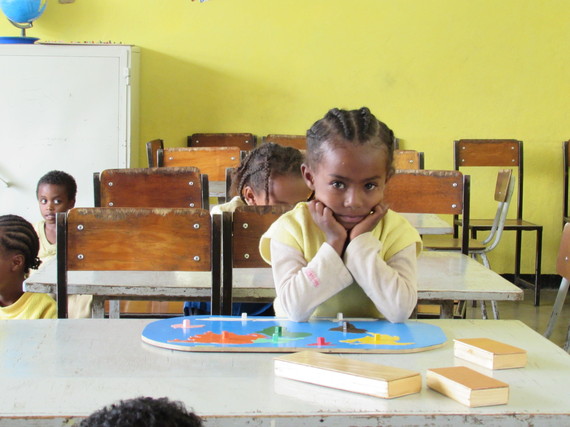Photo: A World at School
"Absence of evidence is not evidence of absence," Carl Sagan once said. It's a good reminder that despite all we've discovered, invented and revealed, our world is still full of untold stories and immense mysteries.
But how much evidence is enough to act? There is substantial evidence that education underpins all efforts to eliminate poverty, foster equity and create opportunity. No one argues against this.
Yet last week, as world leaders gathered to launch the new 15-year global targets to fight poverty -- The Sustainable Development Goals (SDGs) -- not all of the ambitious new agenda is new. Some of it is unfinished and moving backwards. The goal to get all children everywhere access to at least a basic education was supposed to be achieved this year, yet now the deadline has been pushed out to 2030, and numbers of out-of-school children are on the rise.
We failed those 59 million out-of-school children because we failed even to maintain an effort that reflects the urgency of the crisis and what we already know. We failed to invest in the places where the resources are needed most and we failed to target those children who are most at risk. It's not the state of the global economy -- investments in global health have risen 58% in the last 7 years, while investments in education dropped 19%.
Despite evidence that every leap in industry has been built on a concurrent leap in educational access, that a child born to literate mother is 50% more likely to survive past the age of five and that the poorest in our world can not rebuild their war torn countries and can not protect their children without the rewards that education brings, we simply did not do enough.
Legislators, bureaucrats and budget holders continue to say that its not quite clear 'what works best' to get children prepared for the jobs of the future. There is 'not enough data' to show a return on investment for educating children in conflict. 'We're not sure' how we improve the learning outcomes of the most vulnerable. 'We don't have enough information.' They hide behind requests for more proof when the need to act urgently is already clear. They fail even to invest adequately in more research.
All that ends now.
Five former prime ministers and presidents and three Nobel Prize winners were among 20 world leaders appointed last week to the International Commission on Financing Global Education Opportunity, supported by the government of Norway and Prime Minister Erna Solberg and chaired by UN Special Envoy for Global Education and former British Prime Minister Gordon Brown. This Commission is poised to be an essential part of the necessary tipping point on education by delivering research and evidence that will eliminate the option of inaction.
In 2001 The WHO Commission on Macroeconomics and Health report argued conclusively that health investments could 'save millions of lives, reduce poverty, spur economic development, and promote global security ... and yield $186 billion a year.'
This research came on the heels of the launch of the Millennium Development Goals in 2000 and helped and contributed to a 15-year increase in investments in health that have saved millions of lives.
The Education Commission can do the same, not only delivering conclusive research about how to make more financing available to deliver education, but also foster innovation, test policies and share learning on the best ways to deliver access, quality and equity in global education.
The Education Commission could build a body of evidence so airtight, backed by leadership so fierce that those same legislators and bureaucrats that have cut resources destined for the poorest children, who have shifted resources rapidly from one country to the next as if lives were not actually on the line, who have allowed public education systems to deteriorate, will not be able to wriggle off the hook.
Absence of perfect evidence has become an excuse for inertia. It's 2015 and we are capable of giving all children a safe place to play and learn.
The hard work starts now.

